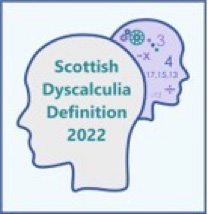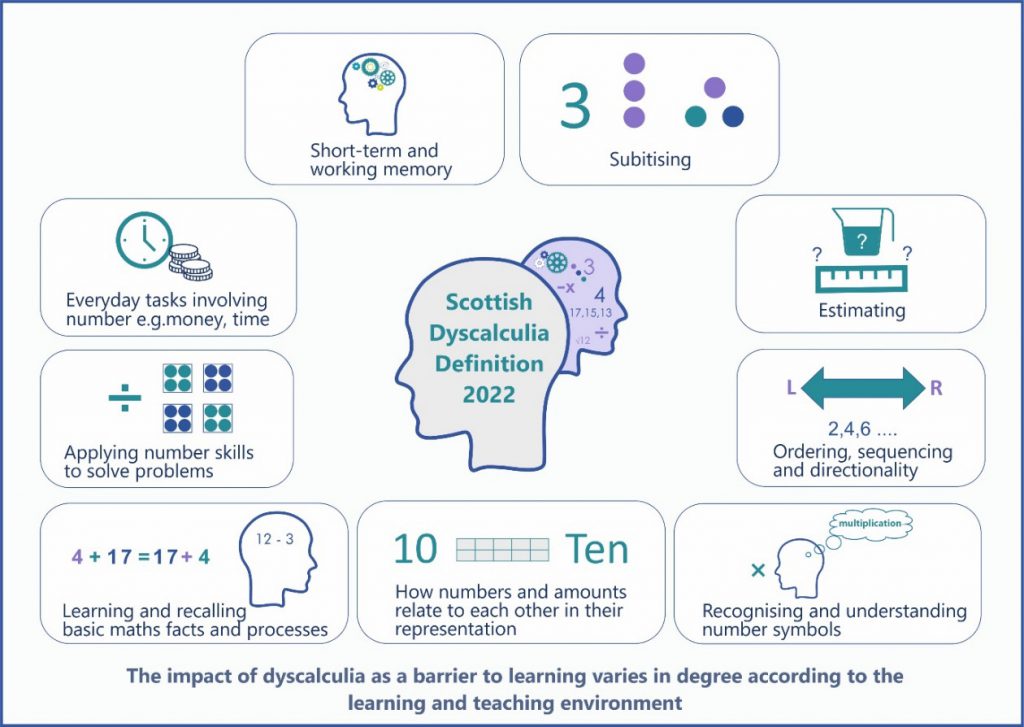What is Dyscalculia?

Dyscalculia and Scottish education
Scotland’s education system is an inclusive one and is designed to make sure that every child and young person is entitled to support to enable them to gain as much as possible from the opportunities which Curriculum for Excellence provides.
The 2022 Scottish Working Definition of Dyscalculia has been collaboratively developed to provide education staff, partners, families and learners with a nationally agreed description of the range of indicators and associated difficulties of dyscalculia.
At all stages, dyscalculia is on a continuum varying from mild to severe, with a range of strengths and difficulties which are affected by the nature of the activity undertaken, the learning environment and any coping strategies and support in place. As a result, every individual with dyscalculia will differ in how they are affected and in the level of severity experienced.
There are, however, a common set of indicators that can be observed which are included within the working definition.
Scottish Working Definition of Dyscalculia
Dyscalculia is a neurodevelopmental learning difference which can co-occur with a range of other specific learning needs.
Dyscalculia can be described as a specific difficulty in understanding number and number processes which persists despite the provision of appropriate learning opportunities. It is distinguishable from other challenges associated with numeracy and mathematics due to the:
- Persistent inability to understand and or retrieve numerical facts from memory
- Use of underdeveloped procedures and processes
- Severity of difficulties with number sense.
Associated difficulties can include:
- Subitising – immediately recognising quantity without counting
- Estimating
- Ordering, sequencing and directionality
- Recognising and understanding number symbols
- How numbers and amounts relate to each other in their representation
- Learning and recalling basic maths facts and processes
- Applying number skills to solve problems
- Everyday tasks involving number e.g. money, time
- Short-term and working memory.
These difficulties often do not reflect an individual’s cognitive abilities. They may not be typical of performance in other areas and cannot be attributed to other factors, for example gaps in learning, developmental, genetic and neurodevelopmental differences which include autism, dyslexia and attention difficulties. The impact of dyscalculia as a barrier to learning varies according to the learning and teaching environment.
Dyscalculia exists in all cultures and across the range of abilities and socio-economic backgrounds. Learners with dyscalculia can continue to make progress in mathematics but may do so at a different pace.
Dyscalculia is likely to be a genetic, life-long, neurodevelopmental difference. Unidentified, it could result in mathematics anxiety, low self-esteem, high stress, atypical behaviour and low achievement. This can have associated impacts on opportunities in adult life.
Learners with dyscalculia will benefit from:
- Appropriate early identification , support, planning and review.
- Tailored support – for example, actively encouraging the use of specific materials which may include concrete materials and visual representations.
- Effective, inclusive learning and teaching pedagogical approaches and environments.
This should lead to successful learners, confident individuals and effective contributors.
Below is a visual representation of the difficulties associated with dyscalculia. How they impact on individuals will vary.

Dyscalculia identification and support
Receiving appropriate additional support is not dependent upon the formal identification of a specific need or label such as dyscalculia. However, this should not mean that schools and local authorities are not supportive of formally identifying additional support needs such as dyscalculia.
The identification of dyscalculia and the understanding of what it means can be extremely important to the learner’s wellbeing and their family and this should not be underestimated.
The information gathered during the collaborative identification process forms part of the ongoing monitoring of the child or young person’s progress and support within Curriculum for Excellence.
This Scottish working definition has been collaboratively developed by a short life working group with representation from:
- The Scottish Government
- Education Scotland
- Association of Scottish Principal Education Psychologists (ASPEP)
- Additional Support for Learning Officers (ASLO)
- Dyslexia Scotland
- Local authority specialist teachers and officers
Consultation with children and young people and a national parent forum also supported the development of the definition.
Support resources
Select here to download the Scottish Working Definition of Dyscalculia 2022.
Select here to download the Scottish Dyscalculia Observation and Planning Tool which can support the identification process and discussions with staff, families and learners.
Select here to see more dyscalculia resources on Education Scotland’s website.
